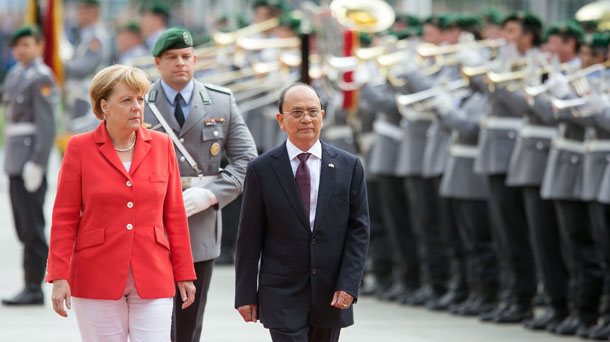BERLIN — When German Chancellor Angela Merkel met visiting President Thein Sein on Wednesday, they agreed on the things Burma needs to do, but disagreed on the order in which it needs to do them.
“For good economic development you need peaceful development and that requires equality and tolerance towards minorities,” Merkel said.
Thein Sein put it the other way round. “If we have economic success, then democratization is easier,” he said. He also pointed out Burma’s three years of democracy had seen many difficulties “but we have nevertheless been able to carry out this enormous democratic process without spilling blood.”
Merkel acknowledged a lot had been done in Burma since its political transition from military rule in 2011, such as on press freedom and added that though it was still a poor country “it has growth rates of over 7 percent so the signs are very good.”
Burma, one of Asia’s poorest countries with many different ethnic minorities, has a by-election late this year and a parliamentary election in 2015. “We hope the elections are free, fair and transparent and that everyone has the possibility to be a candidate and represent their party,” Merkel told journalists after meeting with Thein Sein.
The exercise in democracy does have some limits. Among them are the Constitution’s restrictions on who can run for president.
For instance, it bars anyone from running for president who has immediate family members who are foreign nationals. Opposition leader Aung San Suu Kyi’s late husband and two sons are British, and many observers believe the provision was written specifically to keep the Nobel prize winner from seeking the office.
















